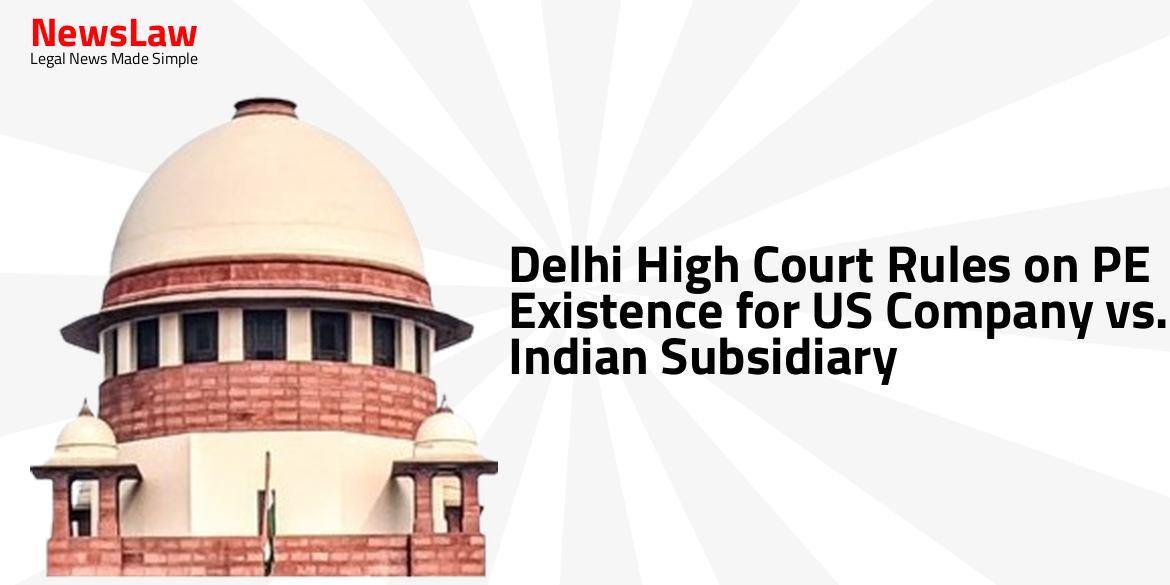In a significant legal ruling, the Delhi High Court has addressed the issue of Permanent Establishment for an US company, Electromotive Diesel Inc., in India through its Indian subsidiary, PRIPL. The judgment delves into transfer pricing studies, various PE types like Fixed Place PE and Service PE, as well as jurisdictional concerns. The case raises pertinent questions regarding international transactions and tax implications.
Facts
- The Assessee, a foreign company registered in the USA, provides technical support services as its main international transaction.
- The Assessee’s wholly owned Indian subsidiary, PRIPL, is assessed in New Delhi and has undergone transfer pricing studies.
- The First Respondent initiated reassessment proceedings based on PRIPL’s operations being deemed a Fixed Place PE, a Service PE, or a Dependent Agent PE.
- The Assessee asserts that its business activities and products are distinct from those of PRIPL, highlighting different production activities.
- The First Respondent’s jurisdiction transfer from the fourth respondent to the First Respondent was objected to by the Assessee.
- The impugned notices under Section 148 were issued, citing a survey report alleging the Assessee’s presence in India through PRIPL as a PE.
- The Assessee filed responses questioning the assumption of jurisdiction and the grounds for reassessment based on the survey report.
Issue
- The fundamental question to be answered is whether a PE could be said to have come into existence within the territorial area over which EMD Locomotive Technology Pvt. Ltd. was empowered to exercise powers conferred by the Act.
- The examination of whether the Section 148 power was justifiably invoked is necessary in this case.
- Determining where the risk or responsibility involved in the delivery of goods lies between EMD Locomotive Technology Pvt. Ltd. Noida and Electromotive Diesel Inc. USA is crucial.
Arguments
- Senior counsel Mr. Datar argued that the Noida premises cannot be considered a virtual projection of the holding company.
- Interrelated transactions were conducted at arm’s length and independently assessed in transfer pricing studies.
- Services by the Indian subsidiary were identical to those in a Supreme Court case, E-Funds IT Solutions Inc., questioning the assumption of jurisdiction under Sections 147/148 of the Act.
- No prima facie view or reasons were recorded in the impugned notices for the charge of income escaping assessment.
- Argument against Noida factory being a Fixed Place PE of the petitioner was presented, citing relevant case laws and lack of exclusive disposal of premises to the petitioner.
- The contention was made that PRIPL constituted a Service PE based on activities and email evidence.
- Issue of DAPE jurisdiction assumption by the first respondent was challenged, asserting PRIPL did not act as a DAPE for the petitioner.
- Contradictions in jurisdictional AO migration to Noida were raised with reference to similar cases and illegal actions.
- Supporting materials for PE existence and income assessment were questioned for not proving the core business activity in Noida or Varanasi.
- The argument was made that the Indian subsidiary was not discharging services for a related enterprise as claimed by the first respondent.
- Legal positions from Formula One World Championship and Morgan Stanley cases were utilized in the argument against Fixed Place PE assumption.
- Summary of sales in India and income assessment reasoning were presented for necessary action under Section 147/148 of the IT Act.
- Preparatory or auxiliary services principles from the Morgan Stanley case were applied to refute the Fixed Place PE claim.
- Emphasis on PAN link to the jurisdictional AO office and the survey’s role in the entire action was highlighted.
- Mr. Agarwal argued that the Indian subsidiary’s activities do not fall within the provision of ‘wholly or almost wholly for the enterprise’ in the India-USA DTAA Article 5(4)(c).
- He referenced the E-Funds IT Solutions Inc. case where the Indian subsidiary performed back office or support services only.
- Mr. Agarwal contended that the subsidiary in this case, PRIPL, assisted in the core services of the petitioner, distinguishing it from ‘auxiliary’ or ‘preparatory’ functions.
- He argued against the issuance of Section 148 notice based on a survey report finding PRIPL as a Fixed Place PE/Service PE/DAPE, claiming it should not be interfered with.
- Mr. Agarwal highlighted that the Supreme Court decisions in E-Funds IT Solutions Inc. and Samsung Heavy Industries Limited, cited by Mr. Datar, are distinguishable from the present case’s facts related to PRIPL’s activities.
- He criticized the selective extraction and consideration of statements by the first respondent in forming their opinion about PE creation based on a wholly owned subsidiary’s existence.
- Mr. Agarwal pointed out that the income derived by the Indian subsidiary from transactions with the petitioner did not meet the ‘wholly or almost wholly’ test as a conduit for the petitioner’s business interests.
- The argument was made that for the Indian subsidiary to be a PE under Article 5(4), it had to not only have the authority to conclude contracts but also habitually engage in executing that authority.
- The actions for reassessment based on the presumption of a wholly owned subsidiary leading to PE creation were deemed unfair and unsustainable by Mr. Datar.
- A comparative chart was presented by Mr. Datar, citing the Union of India vs UAE Exchange Centre and DIT vs Morgan Stanley and Co. judgments, to support the contention that the judgments were rendered in similar factual contexts.
- Article 5(6) of the India-USA DTAA clarifies that a company controlled by a resident of another Contracting State does not automatically constitute a PE.
- Mr. Datar referred to passages from Arvid Aage Skaar’s work on Permanent Establishment to explain the historical background and principles related to subsidiary PEs.
- He argued that the ‘wholly’ and ‘almost wholly’ terms in determining PE under Article 5(4) should be understood in their ordinary English meanings, not exceeding 90 percent for ‘almost wholly.’
Analysis
- The term ‘permanent establishment’ includes various types of establishments such as a place of management, branch, office, factory, workshop, mine, oil or gas well, warehouse, farm, plantation, store, installation for exploration/exploitation of natural resources, construction sites, and provision of certain services.
- Certain activities are excluded from being considered as a permanent establishment, such as use of facilities for storage or occasional delivery, maintenance of stock for processing by another enterprise, fixed place of business for specific purposes like advertising or scientific research.
- In cases where a person is acting on behalf of an enterprise in a Contracting State, that enterprise may be deemed to have a permanent establishment in the first-mentioned State based on various criteria like authority to conclude contracts, maintenance of stock for regular delivery, or securing orders.
- An enterprise will not be considered to have a permanent establishment in another State solely due to carrying out business activities through independent agents like brokers or general commission agents.
- Control or business relationships between companies in different Contracting States do not automatically create a permanent establishment for either company in the other State.
- The concept of a ‘permanent establishment’ was explained as postulating a substantial element of presence of a foreign enterprise in another country.
- Outsourcing of services to India by foreign companies did not establish a fixed place permanent establishment under the treaty.
- Presence had to meet the test of an enduring and permanent nature and not just financial support from the parent company.
- The aspect of whether an establishment was performing preparatory or auxiliary functions was considered.
- The test laid down by the Andhra Pradesh High Court in a previous case fully stood satisfied.
- The principles governing Fixed Place Permanent Establishments were clearly outlined by the Andhra Pradesh High Court and later reiterated by the Supreme Court in various cases.
- Various types of Permanent Establishments were discussed under international tax law.
- The meaning of ‘habitually’ in conjunction with an authority to conclude contracts was explained with reference to the OECD Commentary.
- Jurisdiction cannot be assumed due to inability to sustain the opinion on the question of PE.
- Incorrect decision on PE would render reassessment proceedings unsustainable.
- If the decision on PE had been correct or at least plausible, the Court could have come to a different conclusion.
- Impugned action is based on a foundation that is arbitrary and unsustainable.
- View expressed by the first respondent cannot be considered tentative or open to debate.
- Reassessment proceedings would be liable to be quashed due to the arbitrary foundation.
Decision
- The transfer of PAN of the petitioner was solely to facilitate the first respondent conducting the reassessment.
- The jurisdiction of the PAN of the petitioner has been transferred back to the fourth respondent.
- All rights and contentions of parties in this regard are kept open.
- The writ petitions have been allowed and the impugned notices issued under Section 148 have been quashed.
- The respondents have the right to independently examine whether the office of the petitioner in the Delhi Circle constitutes a PE.
Case Title: PROGRESS RAIL LOCOMOTIVE INC. (FORMERLY ELECTRO MOTIVE DIESEL INC.), Vs. DEPUTY COMMISSIONER OF INCOME-TAX (INTERNATIONAL TAXATION), CIRCLE – NOIDA & ORS. (2024:DHC:4331-DB)
Case Number: W.P.(C)-12410/2019



